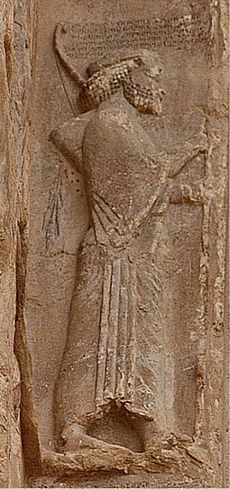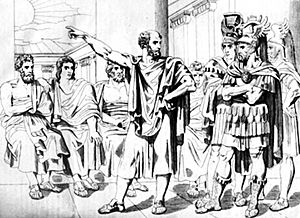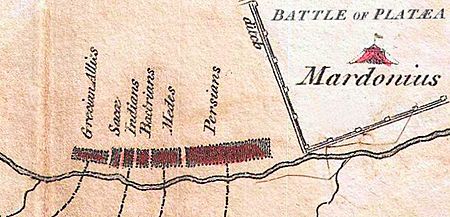Mardonius (nephew of Darius I) facts for kids
Mardonius was an important Persian army leader. He lived in the early 400s BC. Mardonius played a big part in the wars between Persia and Greece. He died in 479 BC during the Battle of Plataea.
Contents
Early Life and Family Connections

Mardonius was the son of Gobryas. Gobryas was a Persian nobleman who helped Darius become king. To make their friendship stronger, Darius and Gobryas arranged special marriages.
King Darius married Gobryas's daughter. Gobryas married Darius's sister. Mardonius himself married Artozostra, who was Darius's daughter. This meant that King Darius was Mardonius's uncle, father-in-law, and half-brother-in-law all at once!
Persian Wars with the Greeks
First Persian Invasion of Greece
King Darius made Mardonius one of his main generals. After a rebellion by the Ionians (Greeks living under Persian rule), Darius sent Mardonius to punish Athens. Athens had helped the Ionians in their revolt.
In 492 BC, Mardonius led his army through the Ionian cities. He removed the Greek rulers called tyrants. Instead, he set up democratic governments. This surprised the Greeks at the time. Historians think Mardonius did this so the Ionians would not rebel again.
After this, Mardonius's army and navy crossed the Hellespont. Mardonius first attacked Thasos, a Greek island known for its gold mines. Thasos then had to pay taxes to the Persian Empire. The Persian navy and army then moved into Macedonia. Macedonia soon became part of the Persian Empire.
However, Mardonius's fleet faced a terrible storm. It happened off the coast near Mount Athos. According to the historian Herodotus, the Persians lost 300 ships. They also lost 20,000 men in the storm. Around the same time, Mardonius was leading his army in a battle in Thrace. He was wounded but won the battle. Thrace was brought back into the empire.
Because of the lost fleet, Mardonius had to go back to Asia Minor. King Darius then removed him from command. Darius chose Datis and Artaphernes junior to lead the next invasion in 490 BC. They captured Naxos and destroyed Eretria. But they were later defeated at the famous Battle of Marathon.
Second Persian Invasion of Greece
Mardonius regained his influence under the new king, Xerxes I. Xerxes was Mardonius's cousin and brother-in-law. At first, Xerxes was not eager to restart the war with Greece. But Mardonius was very influential with Xerxes. He kept trying to convince the king to get revenge for Darius's defeat.
Another advisor, Artabanus, warned Xerxes to be more careful. Herodotus wrote that Mardonius was a bit of a bad advisor. He said Mardonius just wanted to become the governor (called a satrap) of Greece. Herodotus also said Mardonius loved "mischief and adventure."
Mardonius was present at the Battle of Thermopylae. After the Persian defeat at the sea battle of Battle of Salamis, he tried to persuade Xerxes to stay. He wanted Xerxes to fight another campaign. This time, Mardonius could not convince Xerxes. But when Xerxes left, Mardonius became governor of the parts of Greece that Persia had conquered.
He took control of Macedon, which was ruled by King Alexander I. However, King Alexander, being Greek, secretly gave important information about Mardonius's plans to the Athenians. He said he could not stand to see Greece defeated.

Mardonius then captured and destroyed Athens. The city had been empty before the Battle of Salamis. Mardonius offered to give Athens back and help rebuild it. He said this if the Athenians would agree to a truce. But the Athenians refused the truce. They got ready for another battle.
Plataea and Death of Mardonius

Mardonius prepared to fight the Greeks at Plataea. Another Persian commander, Artabazus, disagreed with him. Like Artabanus, Artabazus did not think the Persian army would easily defeat the Greeks.
Mardonius was killed in the battle by the Spartans. Historians Herodotus and Plutarch say a Plataean named Aeimnestus killed Mardonius. His death caused the Persian army to break apart and flee.
Herodotus tells a story about the Spartan leader Pausanias. A man from Aegina suggested putting Mardonius's head on a pole. This was what Xerxes had wanted to do to King Leonidas after the Battle of Thermopylae. Pausanias said this was a barbaric act. He said, "Such doings befit barbarians rather than Greeks...Come not before me again with such a speech."
See also
 In Spanish: Mardonio para niños
In Spanish: Mardonio para niños
 | Jewel Prestage |
 | Ella Baker |
 | Fannie Lou Hamer |

